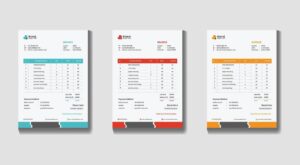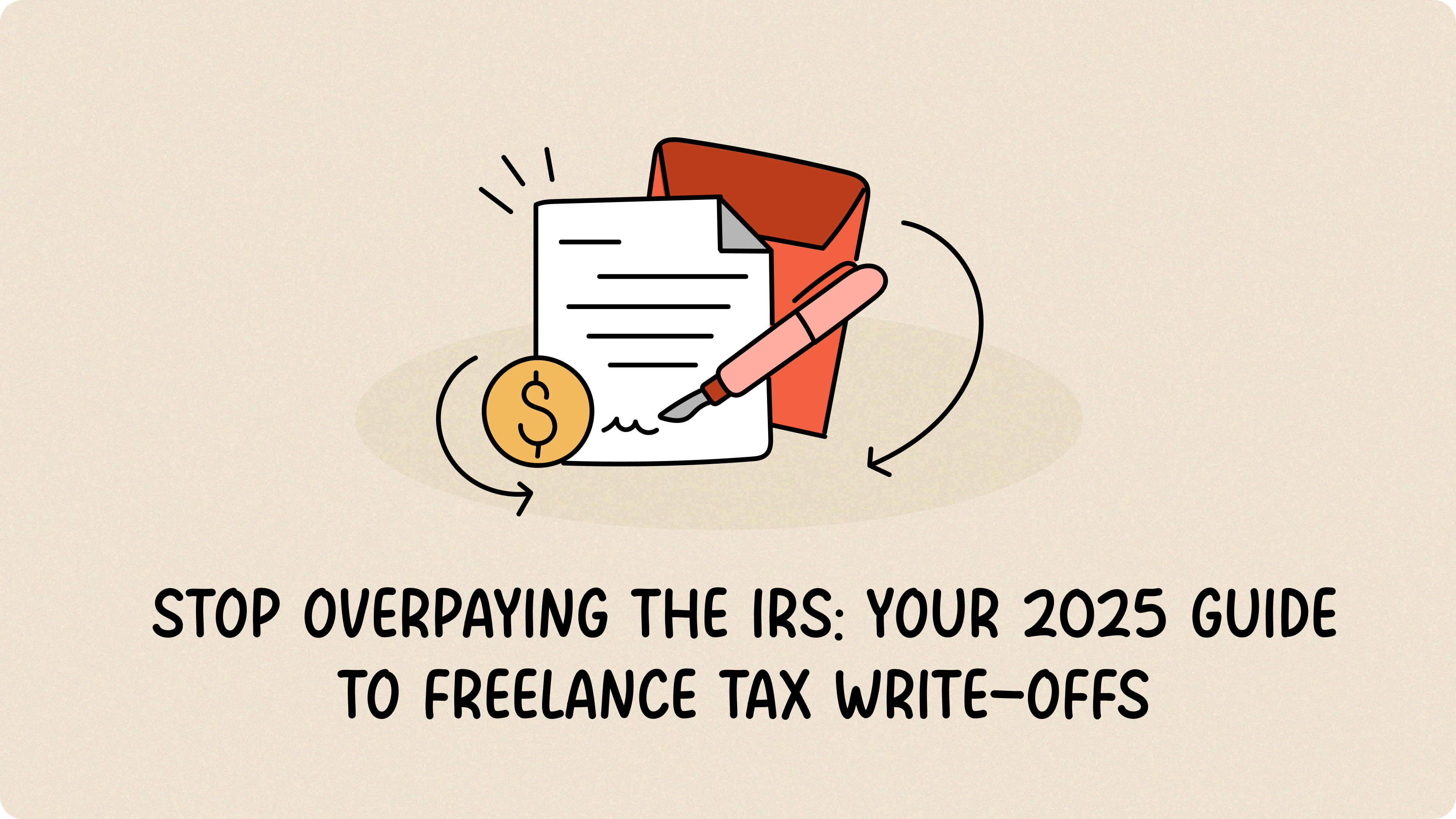Freelancing is more than just a job; it’s a business. And one of the biggest perks of being your own boss is the ability to lower your tax bill by legally deducting business expenses. Every missed deduction is lost cash — and most freelancers are giving money away without realizing it. IRS data shows that nearly 70% of self-employed filers underclaim business expenses. Misplaced receipts, fear of audits, and assuming “it’s not worth it” are some of the most common reasons.
I’ll admit, in my early days I made the same mistakes and missed out on valuable write-offs simply because I didn’t know what to look for or how to track them. It’s like leaving free money on the table, and who wants to do that?
This isn’t just a list of deductions. Think of it as your personal guide to navigating the ins and outs of freelance finances for the 2025 tax year. We’ll cover everything from the home office to health insurance, helping you keep more of your hard-earned money and avoid a last-minute scramble.
Ultimately, a stress-free tax season starts with good record-keeping, and the journey to a lower tax bill begins today.
Table of Contents
- What’s the Big Deal with Tax Deductions?
- The Most Common Tax Write-Offs for Freelancers
- What You Can’t Deduct
- Simple Money Habits That Save You Stress
- Don’t Let Tax Season Overwhelm You
What’s the Big Deal with Tax Deductions?
Think of a tax deduction as a way to reduce your taxable income. The more you can legally deduct, the lower your taxable income becomes, which means you pay less in income tax.
For example, if you earn $60,000 in freelance income and have $10,000 in eligible business expenses, you’ll only be taxed on $50,000. That’s a huge difference!
However, it’s not just about what you deduct—it’s about doing it correctly. The IRS is known for its strict rules, and getting it wrong can lead to penalties. The IRS requires you to file a tax return if you have net earnings from self-employment of $400 or more. It’s crucial to file on time and accurately report all income and expenses.
The Most Common Tax Write-Offs for Freelancers
Here are some of the most popular tax deductions that freelancers and gig workers can claim. It’s vital to remember the golden rule of tax deductions: an expense must be “ordinary and necessary” for your business.
1. Home Office Deduction
This is one of the most significant tax benefits for freelancers who work from home. You can deduct a portion of your home-related expenses if you use a part of your home “exclusively and regularly” as your principal place of business. This includes:
- Rent or Mortgage Interest: You can deduct a percentage of your rent or mortgage interest, reflecting the share of your home that’s truly devoted to your business.
- Utilities: Your work depends on electricity, heating, and internet — and since these keep your business running, a portion of those bills can be deducted too.
- Homeowner’s Insurance: A slice of your homeowner’s insurance premiums is also deductible, since your office space is part of what’s being protected.
- Repairs and Maintenance: If something breaks in your home office — like a burst pipe or a damaged wall — the costs of fixing it count as deductible business expenses.
There are two ways to calculate this deduction:
- Simplified Method: Deduct a flat $5 per square foot of your home office, up to 300 square feet. It’s quick, easy, and requires very little paperwork.
- Regular Method: Work out the actual percentage of your home used for business. For example, if your office is 200 sq. ft. out of a 2,000 sq. ft. home, you can deduct 10% of your eligible home expenses. It takes more record-keeping, but it often results in a bigger deduction.
2. Vehicle Expenses
If you use your car for business — whether that’s meeting clients, attending conferences, or hauling equipment — those costs are deductible. It’s worth noting that you can’t deduct your normal commute from home to a regular office, but if you travel between temporary worksites or make trips that are directly tied to your business, those miles count.
- Standard Mileage Rate: For 2025, the IRS standard mileage rate is 70 cents per business mile driven. This is the easiest method and often results in a solid deduction. You just need to track your miles.
- Actual Expenses Method: With this approach, you deduct the real costs of running your car for business — things like gas, oil, repairs, insurance, registration fees, and even depreciation. It can give you a larger deduction if your car is costly to run, but it does mean keeping careful records of every expense.
3. Health Insurance Premiums
Health insurance can be one of the biggest expenses for freelancers, but the good news is that you can deduct the full cost if you’re self-employed and not covered by a plan through your employer or your spouse’s job. That means 100% of what you pay in premiums for medical, dental, and even long-term care insurance can be written off.
This deduction is especially valuable because it directly lowers the income you’re taxed on, not just as part of itemized deductions. In other words, every dollar you spend on health insurance premiums reduces the income the IRS uses to calculate your taxes — which can make a real difference at tax time.
4. Business Supplies and Equipment
The tools of your trade are fully deductible. This includes:
- Software and Subscriptions: This is a big one for freelancers. Programs like Adobe Creative Suite, cloud storage, project management tools, and accounting software aren’t just nice-to-haves — they’re the tools you rely on to deliver work and stay organised, which makes them fully deductible as business expenses.
- Office Supplies: Even the small stuff matters too. Pens, paper, printer ink, and postage may not seem significant on their own, but together they’re part of the everyday costs of running your business — and the IRS lets you deduct them as well.
- Equipment: If you buy equipment for work, like a computer, camera, or printer, you can deduct the cost. Normally, the IRS requires you to spread the deduction out over several years (this is called depreciation). But thanks to special rules (Section 179 and bonus depreciation), you can often deduct the entire cost in the same year you buy it.
5. Advertising and Marketing
Every successful freelance business needs clients, and getting your name out there comes with costs. The good news is that advertising and marketing expenses are 100% deductible.
This can cover a wide range of things you might already be using to grow your business:
- Paid social media ads on platforms like Facebook, Instagram, or LinkedIn to reach new clients.
- Search engine advertising such as Google Ads to get your services in front of people actively looking.
- Website expenses including hosting fees and domain name costs, since your site is often your digital storefront.
- Printed materials like flyers, business cards, and other promotional items you hand out to potential clients.
6. Education and Training
Investing in yourself is a smart business move, and the IRS agrees. If the education or training you pay for helps you maintain or improve the skills you already use in your current business, those costs are deductible.
This can include:
- Online courses, workshops, and webinars that sharpen your craft or keep you up to date.
- Certifications or licensing fees that are directly tied to your existing field of work.
- Books and subscriptions to industry publications that help you stay informed and competitive.
Keep in mind that you can only deduct training that builds on the work you already do. If the education prepares you for a completely new career, it doesn’t qualify. For instance, a freelance writer could deduct a course on copywriting, but not the cost of a degree in accounting. rates and access discounted prices. Take advantage of flat-rate boxes, which can be cheaper for heavier, smaller items.
What You Can’t Deduct
Knowing what doesn’t qualify is just as important as knowing what does. Mixing in personal expenses is one of the most common mistakes new freelancers make, and it can be a red flag for the IRS. Here are some things that may feel work-related but don’t actually count:
- Your Commute: The drive from your home to a regular office or job site is considered a personal expense, not a business one.
- Personal Clothes: Unless it’s a required uniform or protective gear, everyday clothing isn’t deductible. Even that sharp suit you wear to impress clients is still seen as personal.
- Personal Meals: Grabbing lunch at your desk or coffee on the way to a meeting doesn’t qualify. Meals are only deductible when you’re traveling for business and staying overnight.
- Fines and Penalties: Parking tickets, speeding fines, or other penalties you pick up while working can’t be written off. The IRS won’t let you turn mistakes into deductions.
Simple Money Habits That Save You Stress
When I first started out, I used to dread tax season. Every March I’d find myself scrolling through old bank statements, trying to remember if that random coffee shop charge in July was a client meeting or just me needing caffeine. If that sounds familiar, you’re not alone. So many freelancers end up scrambling and, as a result, miss out on deductions and peace of mind.
The truth is, managing your finances doesn’t have to be a source of anxiety. With a few simple habits built into your routine, you can save yourself hours of stress and keep more of what you earn.
Here are some of the most valuable lessons I’ve learned along the way:
- Separate Your Money
This is non-negotiable. The single best thing you can do for your business is to use a separate bank account and credit card for all your business income and expenses. It makes tracking a thousand times easier and immediately gives you a clean separation between your professional and personal life.
- Embrace the “Slightly Painful, Totally Worth It” Habit
Once a week, spend just 15 minutes reviewing your business transactions. Categorize them as you go. This simple habit will save you days of work at tax time and ensure you don’t miss a single deduction. You’ll thank yourself later.
- Automate Everything You Can
Set up recurring payments for your software subscriptions and internet bills. Link your separate business accounts to a finance app that can automatically pull and categorize your expenses. Automation removes the human error and makes sure no deductible expense is forgotten.
- The Power of Estimated Taxes
Here’s something many freelancers don’t realize at first: the IRS expects you to pay taxes throughout the year, not just in April. Quarterly estimated taxes (due in April, June, September, and January) prevent a giant, stressful tax bill from landing all at once. Think of it as paying your future self — you’re setting aside money in manageable chunks instead of facing a lump sum that wipes out your savings.
- Think Like a Business, Not a Hobby
Even if your freelance work is a side gig, treat it with the financial respect of a real business. Documenting your expenses isn’t just for taxes; it’s a way to understand your business’s financial health. When you know exactly where your money is going, you can make smarter decisions about pricing, investments, and growth.
Don’t Let Tax Season Overwhelm You
Taxes for freelancers don’t have to be a source of stress. By understanding what you can deduct and diligently tracking your expenses throughout the year, you’ll not only save money but also feel in control of your business’s financial health.
This is where a tool like Fynlo comes in. Our easy-to-use software is designed for freelancers and small business owners, making it simple to track your income and expenses, organize receipts, and get an accurate picture of your tax deductions. We take the guesswork out of bookkeeping, so you can focus on what you do best.
Ready to simplify your finances and get a head start on tax season? Schedule a call with us to see how Fynlo can help your business thrive.
You may also like these articles:







